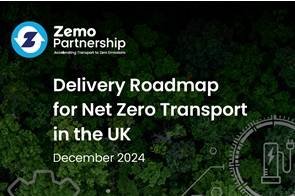Net Zero Delivery Roadmap Calls for Urgent Reform to Powered Light Vehicle Licensing Requirements

Zemo Partnership has today published its Delivery Roadmap for Net Zero Transport, highlighting the pivotal role of mopeds, motorcycles and the wider powered light vehicle (PLV) sector.
The Roadmap outlines an economy-wide, multi-pathway approach, detailing the key interventions needed to reignite progress in the decarbonisation of road transport.
It emphatically supports the role of smaller, lighter vehicles as inherently more energy-efficient throughout their life cycle, while also alleviating congestion, enhancing journey times, and improving air quality.
Zemo’s findings call into question the Department for Transport’s rejection of default bus lane access and its accompanying statement that the Government has “no policy to encourage greater use of motorcycles.”
If the Government is committed to decarbonising transport, enhancing urban efficiency, and ensuring affordable and greener personal mobility in suburban and rural areas, a decisive policy shift is urgently needed.
Seeking to improve uptake of PLVs, the Roadmap urges the Government to begin simplifying PLV user licensing by 2026. The previous administration committed to a licensing review before the election; MCIA calls on the Government to retain this pledge and initiate the review process without delay.
In addition to licence simplification, the Roadmap outlines a suite of transformative policies to decarbonise and modernise transport. These include increasing awareness of PLV benefits among transport planners, stimulating the industrial supply chain, reforming outdated regulation, and implementing grants and incentives to encourage businesses and consumers to adopt PLVs.
Welcoming the report, MCIA CEO Tony Campbell said: “I welcome the publication of Zemo’s ‘Delivery Roadmap for Net Zero Transport’. Its evidence-based findings underscore the importance of a multi-path approach to achieving net zero, emphasising the critical role of smaller, lighter vehicles.
The roadmap recommends urgent policy measures to drive the uptake of mopeds, motorcycles, and other powered light vehicles. I hope this document serves as a wake-up call for the Government to fully harness the L-Category sector’s potential to accelerate decarbonisation—the time for action is long overdue.
I particularly support the document’s call for a user licensing review for the L-Category sector as a matter of urgency. Since launching our A Licence to Net Zero campaign last October, MCIA has been making the case that simplifying the licensing regime is a prerequisite to improving adoption of energy-efficient personal mobility and encouraging a shift away from congestion-inducing cars and vans.”
ENDS
Notes for Editors:
MCIA represents over 90% of the supply side of the industry; the manufacturers and importers of powered two wheelers (PTWs) and other PLVs (or L-Category vehicles), accessory and component suppliers and companies providing associated services. For more information about MCIA or to interview Tony Campbell, CEO, please call 07976 714094 or email s.waters@mcia.co.uk.
Follow MCIA on X: @MCIATweets
Follow MCIA on LinkedIn @MCIAUK
Examples and definitions of the different L-Category Vehicles (L1 to L7) can be found here.
